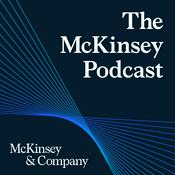311 episódios

The Word Before Work is leaving this podcast app. Here's where to find it!
12/5/2025 | 1min
Get The Word Before Work for free via email: https://www.jordanraynor.com/blog

What C.S. Lewis said after landing his dream job
05/5/2025 | 5min
Sign-up for my free 20-day devotional, The Word Before Work Foundations, at http://TWBWFoundations.com--Series: Five Mere ChristiansDevotional: 5 of 5[Jesus said,] remain in my love...I have told you this so that my joy may be in you and that your joy may be complete. (John 15:9, 11)The search for joy was the dominant theme of C.S. Lewis’s life. And he sought it apart from Christ in all the usual (and some unusual) places: alcohol abuse, an alleged affair with his dead best friend’s mom, and perhaps most relatably his career.In 1925, after years of professional disappointments, Lewis landed his dream job as Fellow and Tutor in English Literature at Magdalen College in Oxford. In an induction ceremony that had all the pomp and circumstance a 467-year-old college can muster, Lewis knelt before the president of Magdalen College, who dramatically met his gaze and declared, “I wish you joy.” Lewis then rose and proceeded around the room, stopping in front of each new colleague who echoed the refrain: “I wish you joy,” “I wish you joy,” “I wish you joy.”I guarantee you that in that moment, C.S. Lewis believed he had finally found joy in the ultimate. He had achieved his vocational dream! But by God’s grace, Lewis came to learn what every successful professional inevitably does: that without Christ, even a dream job will eventually turn into a nightmare. It is only by remaining in Christ’s love that “your joy may be complete” (see John 15:11). Here’s how Lewis himself said it years later: “God cannot give us a happiness and peace apart from Himself, because it is not there. There is no such thing.”Is it wrong to find joy in our work? Absolutely not! God created us to love our jobs (see Genesis 1:26-28 and Ecclesiastes 2:24). But Lewis’s story and today’s passage remind us that we mere Christians glorify God by finding our ultimate joy in Christ and not our work.Is your mood perfectly correlated to whether you’re winning at work? Do you spend less time with the Lord when things aren’t going your way? Are you unable to enjoy God’s gift of rest from your work? Take it from someone with loads of experience in this area: If you answered yes to any of those questions, you’re probably looking to your work to provide you with the ultimate joy that can be found only in Christ.If that’s you, let me encourage you to do three things right now: Confess your idolatry to God and other believers Meditate on the gospel Ask the Lord for his power to enjoy the good gift of work without turning it into an idolatrous ultimate goodIn doing this, you will be glorifying God as you work today!

Jesus changed the world through culture, not politics. Here’s how you can too.
28/4/2025 | 5min
Sign-up for my free 20-day devotional, The Word Before Work Foundations, at http://TWBWFoundations.com--Series: Five Mere ChristiansDevotional: 4 of 5Jesus spoke all these things to the crowd in parables; he did not say anything to them without using a parable. (Matthew 13:34)Jesus revealed God’s kingdom primarily through culture rather than politics. He never sought a seat on the Sanhedrin or in the Roman Senate. Instead, he changed the world with parables—tiny tales that stirred hearts to long for God’s kingdom.Yet despite Jesus’s example, many Christians put far more faith in political solutions than cultural ones to fix the world’s problems today. We believe electing the “right people” and appointing the “right judges” will finally bring God’s kingdom on earth as it is in heaven.This mindset explains why William Wilberforce, a member of the British Parliament in the 18th century, gets the lion’s share of the credit for abolishing the slave trade—even though historians and Wilberforce himself gave equal credit to Hannah More, a poet, playwright, and novelist who outsold her contemporary Jane Austen ten-to-one. Eric Metaxas, a biographer of both Wilberforce and More, says, “How Wilberforce came to be the chief champion of abolition...has everything to do with Hannah More.” While Wilberforce worked to change politicians’ minds, More worked to change the people’s hearts through art that exposed slavery’s horrors.Jesus’s parables and Hannah More’s poetry point to an important truth: We mere Christians glorify God by advancing his kingdom culturally and not just politically.What might this mean for you today? Consider abortion as a case study. Murder has no place in the kingdom of God. And so it is right to ask the question, “What is the political response to this problem?” But the far more powerful question is, “What is my creative response to this problem?” If you’re an artist like Hannah More, your response might be to write stories and songs that break people’s hearts toward orphans and birth parents. If you’re a business leader, it could be creating generous maternity and paternity policies or funding adoptions for employees. If you work in a café, it might mean setting up a board with resources for pregnancy centers.Here’s my point: Please don’t wait for politicians to reveal God's kingdom—be the creator who makes it visible today. Whatever the issue is—abortion, racial injustice, gender transitioning, pollution, etc.— glorify God not just by working to change things politically but first and foremost culturally. Because as Andy Crouch said, “The only way to change culture is to create more of it.”

LEGO’s founder on how godly play—not just productivity—pleases God
21/4/2025 | 6min
Who cuts a channel for the torrents of rain, and a path for the thunderstorm, to water a land where no one lives, an uninhabited desert (Job 38:25-26)Most people didn’t view the Great Depression as the best time to launch a toy company. But that’s exactly when LEGO, the most successful toy brand of all time, was born.The company’s founder, a devout Christian aptly named Ole Kirk Christiansen, had spent years building a traditional carpentry business. But by the early 1930s, business was slumping while his debts were soaring. So he pivoted to making toys like yo-yos, toy cars, and eventually LEGO bricks.And everyone told him he was out of his mind.“I think you’re much too good for that, Christiansen,” one friend said. “Why don’t you find something more useful to do!” The world was in crisis after all. People needed food, not toys. But Christiansen disagreed. In his own playful life and the life of the business he created to help others play well, Christiansen demonstrated a deep understanding of this truth: We mere Christians can glorify God by embracing fun, beauty, play, and “useless” work because our heavenly Father does the same.That’s what we see in today’s passage. God says that he sends “torrents of rain...to water a land where no one lives.” Why would God make it rain in an uninhabited desert? Apparently just for the fun of it!Commenting on this verse, theologian Dr. R. Paul Stevens says that God’s playful nature should produce in his people a “freedom from the tyranny of utility.” In other words, godly play—not just productivity—pleases God.I’ll be the first to admit that I am glacially slow to learning this. But by God’s grace I am coming to see that play is productive for my soul and my goals. As Dr. Stuart Brown says, “In the long run, work does not work without play.”If you, like me, are not used to playing, let me encourage you to adopt this practice I recently found very helpful: Take stock of your play history. Ask yourself what you did as a kid or as an adult that felt like play. Based on my study of the work of Dr. Brown and others, I define play as any activity that has these 5 characteristics:I would say I “get” to do it rather than “have” to do itI lose track of time while I’m doing itI can’t wait to do it againI can’t stop talking about it with othersI have no deadline to complete the activityOnce you’ve made a list of things that have historically felt like play, schedule 30-90 minutes this week to engage in one of those activities knowing that you, like LEGO’s founder, can glorify God as you do!

When this woman walked out of a room, MLK followed
14/4/2025 | 5min
Sign-up for my free 20-day devotional, The Word Before Work Foundations, at http://TWBWFoundations.com--Series: Five Mere ChristiansDevotional: 2 of 5Love your enemies, do good to those who hate you. (Luke 6:27)Fannie Lou Hamer had just given birth, but the only cry in the room was her own. Twice now, she had watched her body grow along with her hope, only for her labor pains to usher in death rather than life. And then there were the miscarriages—losses that came so early she never even felt the joy of kicks in her womb.Those losses—coupled with her extreme poverty and slave-like work as a sharecropper in Mississippi in the early 1900s—ensured that Hamer moved through her days in a fog. Until a doctor gave her hope: With surgery, the doctor assured her, all of her infertility problems could go away. Hamer eagerly signed off on the procedure. But after the surgery, Hamer discovered the unthinkable: The doctor had removed her uterus in a complete hysterectomy done without her knowledge or consent. Hamer’s dreams of having her own children were now utterly and truly dead.Believe it or not, this was arguably not the most tragic thing to happen to Fannie Lou Hamer who would go on to become one of the most significant civil rights activists in the 20th century, largely responsible for giving African Americans the right to vote. But here’s what’s remarkable: Whether it was the surgeon, the police who beat her in prison, or the politicians who threatened her life, Hamer is never recorded as speaking a single word of hate against her perpetrators. One time when U.S. Senator Hubert Humphrey proposed an egregiously unjust compromise, Hamer replied, “Senator Humphrey, I’m gonna pray to Jesus for you.” And then she walked out the door as Dr. Martin Luther King, Jr. followed behind her.Jesus said, “Love your enemies, do good to those who hate you.” Hamer shows us an example of what that looks like and reminds us that we mere Christians glorify God by doing justice without hating the unjust.The world often tells us that doing justice requires that we also publicly shame and “cancel” the unjust. But God calls his people to a different way (see Micah 6:8 and Matthew 5:43-44). So, how can you and I practically do justice without hating the unjust today? First, take a risk to speak out against injustice. As God’s ambassador in your workplace, you are called to speak out against injustices respectfully (see Ephesians 5:11). Second, refuse to take revenge against the unjust knowing that vengeance is God’s alone (see Romans 12:19).Finally, pray for the unjust per Jesus’s example knowing that you, like Christ, will be glorifying your Father in heaven as you do (see Luke 23:34).
Mais podcasts de Negócios
Podcasts em tendência em Negócios
Sobre The Word Before Work
Ouve The Word Before Work, O CEO é o limite e muitos outros podcasts de todo o mundo com a aplicação radio.pt

Obtenha a aplicação gratuita radio.pt
- Guardar rádios e podcasts favoritos
- Transmissão via Wi-Fi ou Bluetooth
- Carplay & Android Audo compatìvel
- E ainda mais funções
Obtenha a aplicação gratuita radio.pt
- Guardar rádios e podcasts favoritos
- Transmissão via Wi-Fi ou Bluetooth
- Carplay & Android Audo compatìvel
- E ainda mais funções


The Word Before Work
descarregue a aplicação,
ouça.

































